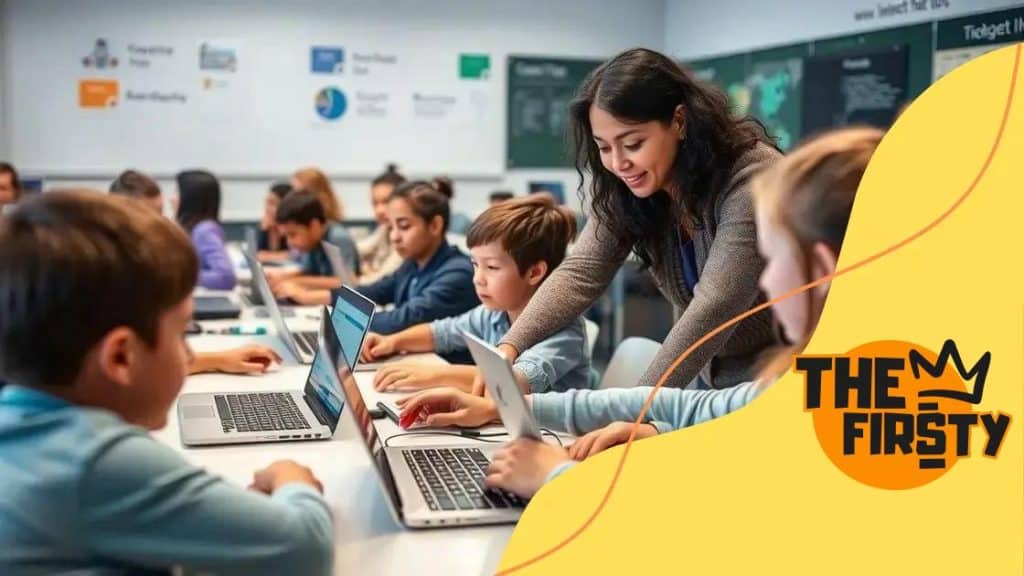The growing role of coding education in schools

Anúncios
The growing role of coding education in schools equips students with essential skills, enhances job prospects, and prepares them for a technology-driven future through various supportive initiatives.
The growing role of coding education in schools is something many parents and educators are talking about. Have you noticed how crucial these skills are becoming for today’s students? Let’s dive into what this shift means for learning and future careers.
Anúncios
Understanding coding education
Coding education is becoming essential in today’s schools. Understanding coding education can help students develop important skills for the future. With technology rapidly evolving, students who learn coding can navigate a digital world more effectively.
What is coding education?
Coding education teaches students how to write code and create programs. It includes languages like HTML, Python, and JavaScript. Students learn to think critically and solve problems. These skills are crucial in various professions.
Benefits of coding education
The advantages of introducing coding in schools are numerous:
Anúncios
- Enhances problem-solving skills: Students learn to tackle challenges logically.
- Boosts creativity: Coding allows students to express their ideas through projects.
- Prepares for career opportunities: Many jobs now require coding knowledge.
- Encourages teamwork: Students often collaborate on coding projects.
By learning to code, students gain confidence in technology. They also understand how behind-the-scenes elements of websites and apps work. Schools can incorporate coding in various subjects, making learning more interactive.
Teachers play a key role in making coding engaging. They can use games and practical projects to make lessons fun. Introducing coding at a young age can spark interest and lead to advanced learning later on. Students who enjoy coding may pursue it as a career.
Challenges of implementing coding education
While the importance of coding education is clear, schools face challenges. One hurdle is access to resources. Not all schools have computers or software needed for coding. Teacher training is also essential to ensure effective instruction. Schools can overcome these obstacles by seeking partnerships with tech organizations and leveraging online resources.
As coding becomes a staple in education, it is vital to keep evolving the curriculum. Schools should adapt to new technologies and methods to keep students engaged. Additionally, regularly updating resources will help maintain interest among students.
Benefits of coding in early schooling
The benefits of coding in early schooling are significant. Starting young gives students a head start in essential skills for the digital age. They not only learn how to code but also develop critical thinking and problem-solving abilities.
Key Advantages
Implementing coding in early education has several key advantages:
- Encourages logical thinking: Children learn to break down problems into manageable parts.
- Boosts creativity: Coding allows students to create games and stories, enhancing their imagination.
- Improves collaboration: Working on projects together fosters teamwork.
- Builds confidence: Completing coding tasks gives a sense of achievement.
In addition to these benefits, coding helps children understand technology more deeply. By creating their own projects, they see how software is built and improved. This knowledge is crucial as technology influences many aspects of life today. When students grasp how coding works, they become more informed users of technology.
Coding education also aligns with many educational objectives. It complements math and science teaching, integrating various subjects. Schools that incorporate coding can make lessons more engaging and interactive. Children often enjoy learning through games and hands-on activities.
Long-term Impact
The impact of learning coding early can stretch well beyond the classroom. As students develop these skills, they prepare for future careers that require technology knowledge. Many jobs now involve coding or understanding software development. By starting early, students can explore various fields, from gaming to healthcare technology.
Moreover, introducing coding at a young age can inspire lifelong learning. Students who enjoy coding may continue developing their skills into adulthood. This passion can lead to careers in software engineering, data science, and many more exciting fields.
Challenges schools face in implementing coding

Despite the clear benefits, schools encounter various challenges in implementing coding education. These obstacles can affect how effectively coding is taught and received by students. Addressing these challenges is crucial for making coding a standard part of the curriculum.
Resource Limitations
One of the main challenges is the lack of resources. Many schools do not have enough computers or appropriate software for students to learn coding. Additionally, internet access can be limited in some areas. These factors create unequal learning opportunities for students.
Teacher Training
Another significant challenge is the need for proper teacher training. Many educators may not feel confident in their coding skills. Without adequate training, they may struggle to teach coding effectively. Professional development programs are essential to equip teachers with the skills they need.
Moreover, integrating coding into existing subjects can be tough. Teachers often have a full curriculum and might find it challenging to add new material. Schools need to prioritize coding education to ensure it fits into the learning framework.
Curriculum Development
Creating a comprehensive coding curriculum presents another challenge. It can be difficult to establish a curriculum that meets educational standards and engages students. Schools must collaborate with tech experts to develop materials that are both effective and relevant. Continuous updates are necessary as technology evolves rapidly.
Furthermore, ensuring student interest in coding can be challenging. Some students may find coding intimidating or boring. It is essential to present coding in a way that captures their imagination and encourages exploration. Incorporating interactive projects and gamified learning can help mitigate this concern.
Support from Administration
Finally, support from school administration is vital. If school leaders do not prioritize coding education, it will likely be sidelined. Funding for coding classes, resources, and training must be secured to create a successful program. Advocacy for coding education at all levels is essential for long-term success.
How coding skills enhance future job prospects
Learning coding skills has a significant impact on a student’s future job prospects. As technology continues to evolve, the demand for individuals with coding expertise is growing. Students who grasp these skills early can unlock a wide range of career opportunities.
High Demand in the Job Market
Many industries rely on technology, making coding skills essential. Employers are seeking candidates who can create and manage software solutions. Understanding programming languages such as Python, Java, or HTML can set job seekers apart from others.
Career Opportunities
Having coding skills opens doors to various career paths, including:
- Software Development: Developers build applications and systems.
- Web Development: Web developers create and maintain websites.
- Data Analysis: Analysts use programming to interpret complex data sets.
- Game Design: Coders design and develop video games.
Many other fields also benefit from coding knowledge. For example, fields like healthcare technology and finance use coding to improve efficiency and innovate solutions. This versatility shows how valuable coding is across multiple job sectors.
In addition to specific job roles, coding skills often lead to higher salaries. Many technology-related professions offer competitive pay due to the specialized knowledge required. Companies are willing to invest in workers who can help them stay ahead in the digital age.
Skills Development Beyond Coding
Learning to code also develops other essential skills. As students work through coding projects, they enhance their problem-solving abilities and critical thinking. They learn how to break complex tasks into manageable steps, a skill that is useful in any job. Collaborating with peers on coding projects promotes teamwork and communication skills, preparing students for the workplace.
Moreover, coding cultivates a growth mindset. Students often encounter challenges while coding, teaching them perseverance and resilience. These traits are highly valued by employers, as they contribute to a positive workplace culture and effective problem-solving.
Conclusion: Preparing for the Future
Ultimately, coding education equips students with vital tools for their careers. As technology continues to shape the job market, those with coding skills will likely find themselves at a significant advantage. Schools that prioritize coding education help prepare their students for thriving futures in diverse job markets.
Initiatives promoting coding education
Many initiatives promoting coding education have emerged in recent years, aiming to enhance students’ skills in coding and technology. These initiatives help address the need for more coding education in schools. By offering resources and support, they prepare students for a technologically advanced future.
Government Programs
Government initiatives play an important role in promoting coding education. Many countries have introduced programs to integrate coding into school curricula. These programs often provide funding for resources, teacher training, and curriculum development.
Non-Profit Organizations
Non-profit organizations also contribute significantly. They often run workshops and provide volunteer instructors to teach coding. Some organizations focus on underrepresented groups to ensure that all students have access to coding education. For example:
- Girls Who Code: This organization aims to close the gender gap in technology and promote coding among girls.
- Code.org: Code.org offers free coding courses and resources for students and teachers, making coding accessible to all.
- Black Girls Code: This initiative focuses on empowering young girls of color to pursue careers in technology through coding.
These organizations provide vital support and resources to schools and students. Their efforts help cultivate interest in coding and technology.
Corporate Sponsorships
Many tech companies are also stepping up to support coding education. Through sponsorships and partnerships, they provide funding and mentorship. These corporate initiatives often include:
- Tech Camps: Companies host coding camps where students can learn directly from industry professionals.
- Internship Programs: Some companies offer internships to students, giving them real-world experience in tech roles.
By collaborating with schools, these companies contribute to developing the next generation of tech leaders.
Community Engagement
Community initiatives are essential for promoting coding education. Local community centers often host coding clubs and workshops for students. These programs encourage peer learning and foster a sense of community around coding. Parents and educators often join forces to create events that inspire students to learn coding in a fun and interactive way.
Overall, various initiatives come together to promote coding education, making it more accessible and engaging for students. With support from governments, non-profits, and local communities, the future of coding education looks bright.
FAQ – Frequently Asked Questions about Coding Education
Why is coding important for students?
Coding is essential as it develops critical thinking, problem-solving skills, and prepares students for a tech-driven job market.
What initiatives support coding education?
Various initiatives like government programs, non-profits, and corporate sponsorships help promote coding in schools and provide resources.
What career opportunities can coding skills provide?
Coding skills lead to various careers such as software development, web design, data analysis, and more, often with high salary potential.
How can parents support their children’s coding education?
Parents can encourage interest by providing resources, enrolling them in coding classes, and supporting coding projects at home.





